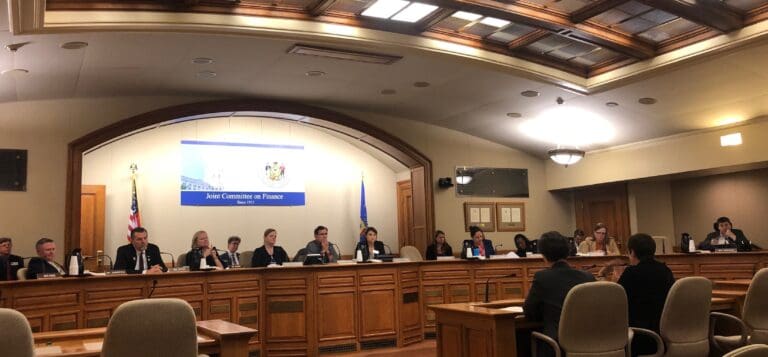
 The Alliance’s Education Policy Committee has long supported improving the transfer of credits among higher education institutions. On Thursday, September 12, the Alliance testified at the Assembly Committee on Colleges and Universities in support of two Assembly bills that advance these efforts: AB 189 and AB 371.
The Alliance’s Education Policy Committee has long supported improving the transfer of credits among higher education institutions. On Thursday, September 12, the Alliance testified at the Assembly Committee on Colleges and Universities in support of two Assembly bills that advance these efforts: AB 189 and AB 371.
Click here to watch the testimony from Robyn Ludtke, our director of talent development. Read our letter of support below.
September 12, 2019
Recognizing that education is critical to developing a strong future workforce, the Alliance is focused on fostering effective education pathways that prepare students for job opportunities in the marketplace today, and in the future.
An important aspect of making those pathways effective is reducing the time and cost to obtain a post-secondary degree, which we feel can be positively impacted by improving the transferable credits among higher education institutions. Support for a comprehensive, coherent credit transfer system has been a policy priority of the Waukesha County Business Alliance for years.
We are encouraged to see both Assembly Bill 189 and Assembly Bill 371 propose improvements to higher education credit transfer in Wisconsin – we think this is a critical topic and the business community supports continued engagement and effort on addressing issues with the existing system.
Workforce development is the number one issue facing Waukesha County, the region and our state. An Alliance survey found that more than 85% of Waukesha County employers plan to expand their workforce in the next three years, yet 82% are unable to find enough qualified workers.
While we’ve made excellent progress over the years on articulation and transfer, there continue to be challenges with transferability of credits. Currently, 45% of students who transfer credits from the Wisconsin Technical College System enroll in the University of Wisconsin system. Around 20% enroll in Wisconsin Association of Independent Colleges and Universities (WAICU), and the remainder transfer to out-of-state institutions. We feel it’s an economic imperative to keep as many of those students as possible in our state, and give them the opportunity to enjoy in-state tuition and all the other advantages of a UW education. Of the students who do transfer into UW, the average GPA after their first year is 3.0, and their second-year retention rates are very similar to transfers from other sectors.
However, many students are at a disadvantage when it comes to completion if many of their credits are not accepted, are counted as electives rather than program courses, or they are forced to pay twice for classes they’ve already passed. On the other hand, some UW institutions have excellent agreements with certain technical colleges. Currently five of 16 technical colleges have full, designated transfer programs—Milwaukee does, but Waukesha does not. We think it makes sense to provide equal opportunity across the state, regardless of where you live.
In Southeastern Wisconsin, the Milwaukee School of Engineering (MSOE) currently has articulation agreements with six technical colleges to accept technical college graduates as juniors. MSOE recently requested assistance to further expand that agreement to encompass all technical colleges. It only makes sense to strengthen the pipeline to UW campuses as well.
The Alliance has a broad and diverse membership representing everything from sole proprietorships to some of the largest employers in the region from a variety of industries. Our 1,200 member organizations represent more than 75,000 employees.
Anything we can do to align education with business and prepare students for success is a win-win. Improving and increasing the transfer of credits among our state’s higher education institutions is an important part of the equation.
Best,
Suzanne Kelley
President & CEO
Waukesha County Business Alliance, Inc.
Share on Social Media
Recent News
Sign up for newsletter updates
